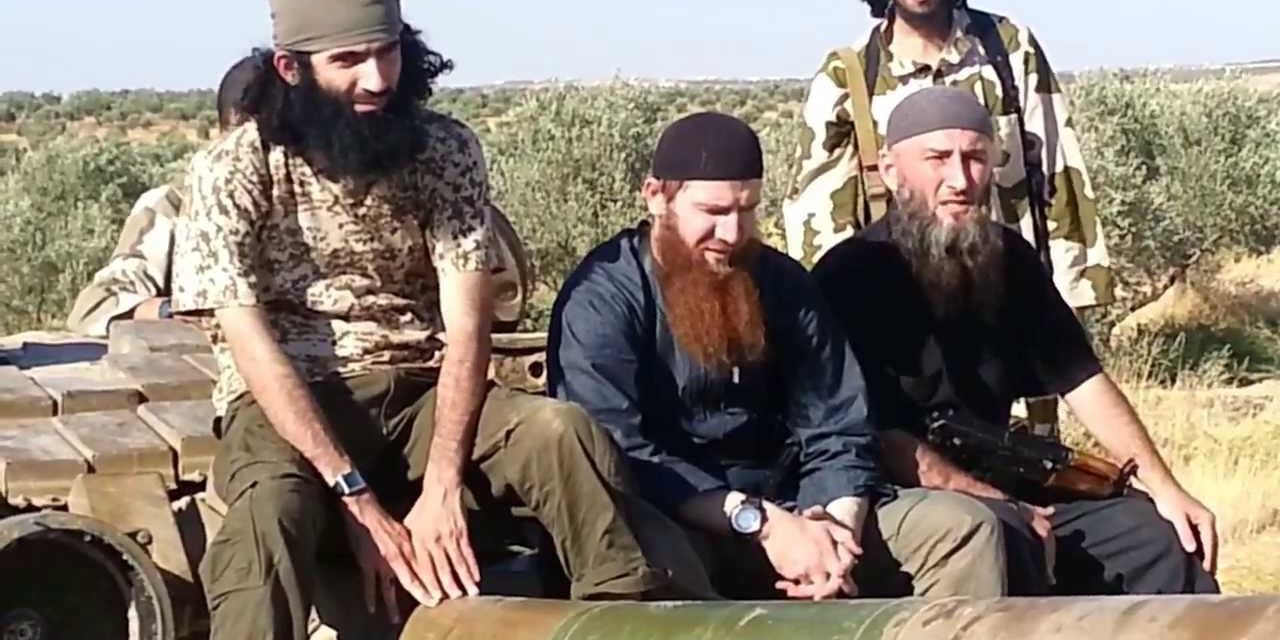There is one website, FiSyria, which claims to speak for Chechens who are fighting in Syria.
There is another website, Kavkaz Center, which claims to speak for the Caucasus Emirate and Chechen who are fighting in Syria.
They do not like each other.
Last week FiSyria wrote of Kavkaz:
Is this the face of the Caucasians? As the face of the Caucasians they have disgraced themselves and many laugh at them, calling them the Woof-Woof Center.
These are the latest lines in a story of how foreign fighters from the North Caucasus, who ventured to Syria from 2012 to wage jihad against the Assad regime, wound up fighting each other.
It is a story of how one faction aligned itself with the Syrian insurgency, but how another chose the Islamic State of Iraq and as-Sham — who are in a battle with that insurgency.
The Chechens began to organize themselves in early 2013 with the creation of Jaish al Muhajideen wal Ansar in spring 2013, but it was in August that they came to prominence with a role in the capture of Menagh Airbase in Aleppo Province. Others in JMA participated in the insurgent offensive in Latakia Province in western Syria.
The leader of JMA was Abu Umar Shishani, an ethnic Chechen who had grown up in Georgia, served in the Georgian army, and spent time in prison before coming to Syria.
However, this was not his only position: he had also been named an Emir of the Islamic State of Iraq and as-Sham, given command of its “northern forces”, including those in the Latakia offensive. And it was in that position that tensions began to develop.
Within weeks of the Menagh operation, some of the Chechens broke away, preferring not to swear allegiance to ISIS. Abu Umar posted a video message trying to re-assert his authority:
I want to remind (you) that this endeavor, this jihad, is not a personal endeavor, it is an endeavor of the Ummah (the Muslim community), it is a question of the Ummah. And therefore, nobody has the right today to sit doing nothing, with folded arms.
The message did not work. A Chechen force, led by Umar’s former second-in-command Sayfullakh Shishani, aligned itself with the Islamist faction Jabhat al-Nusra — which was in a dispute with ISIS since the spring over who should lead the jihadist effort in co-operation with Syrian groups.
Abu Umar, who was moving across the country to command fights not only against Assad forces but also Kurdish militia, insisted that he had the support of Dokku Umarov, the leader of the Chechen movement fighting for independence from Russia. Other Chechen commanders maintained that Umar could not put allegiance to ISIS ahead of a commitment to Umarov and the Chechen Emirate. Command of JMA was taken over by Salahuddin al-Shishani.
That state of tension might have been contained, with the various Chechen groups each pursuing the fight against the Assad regime in their own way; however, in January, ISIS effectively declared war on the Syrian insurgency. Abu Umar’s forces had to pull out of positions in Aleppo Province, including the villa in Hreytan that Umar had used as a base.
Meanwhile, other Chechen jamaats worked with Jabhat al-Nusra in offensives in Aleppo Province. Sayfullakh Shishani was killed in February in the siege of Aleppo Central Prison, but his unit continued its fight. So did JMA, which has been involved in this month’s advances in northwest Aleppo, including attacks on a major Air Force intelligence headquarters.
Which brings us to the latest chapter of FiSyria’s attack on its former ally, Kavkaz Center.
Kavkaz’s sin? It published an article saying that Jabhat al-Nusra has been attacked on two sides — by the Syrian regime and by the “cowardly” strikes of ISIS.
The FiSyria article was posted as Jabhat al-Nusra was publishing its own denunciation. It implicitly accused ISIS — already suspected of killing Abu Khaled al-Suri, the envoy tasked by Al Qa’eda to mediate between the feuding groups — of the murder of its commander in Idlib Province, his brother, his daughter, and other relatives.
So far from abating, the insults and the fighting are likely to escalate.
Last August, just after the capture of Menagh airbase, excitable newspapers and analysts declared that the Chechens had led the offensive.
That was always an exaggeration, and eight months later, the simplicity of “foreign jihadists in command” has been exposed. Far from being unified in an ideological mission, the jihadists are bitterly — and probably permanently — divided, fighting each other as much as Assad.
(h/t Joanna Paraszczuk)

